

Every November, city streets in South Korea go silent, flights are grounded, and the nation collectively holds its breath for one day. The reason for this annual ritual is Suneung, the country’s College Scholastic Ability Test (CSAT).
This is a gruelling nine-hour university entrance examination that can define the trajectory of a young person’s life, similar to China’s Gaokao.
This year, more than 5,50,000 students took the test across 1,300 centres, beginning promptly at 08:40 am. Police escorts rushed latecomers to venues, while government offices opened an hour later, and vehicular traffic was rerouted.
Even air traffic was halted for over an hour during the English-listening section, in an extraordinary show of respect for examinees.
The marathon, lasting some nine hours for most, and up to 13 hours for those with visual impairments, is rigorously timed and structured, covering Korean, mathematics, English listening, science or social studies electives and more.
For many young Koreans, success in this exam opens the gateway to the prestigious “SKY” universities: Seoul National University, Yonsei University and Korea University.
However, behind the yearly ritual and spectacle lies immense pressure on the students. Years of after-school cram academies called hagwons, sleepless nights, and parental expectations culminate in this single day.
The results of the Suneung will be out on December 5, and will act as a determinant of the future of several thousands of youngsters in South Korea.
